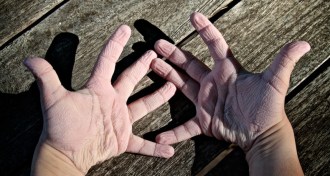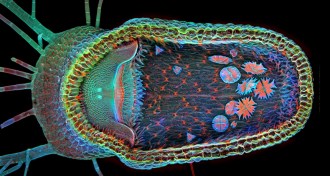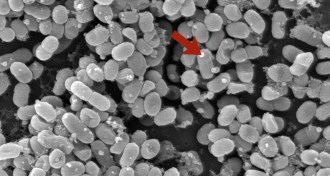Uncategorized
-
 Cosmology
CosmologyFrom Dust to Life
In about 300 pages, this book sums up the history of all that matters — or at least everything made of matter — from the Big Bang to life on Earth.
By Janet Raloff -

-
 Animals
AnimalsWrinkle arises in soggy hand studies
An experiment bucks earlier finding that ridges help fingers grasp.
By Beth Mole -
 Agriculture
AgricultureDealing with change, climate and otherwise
Wine, DNA, our understanding of the universe: It's all changing, whether we are ready for it or not.
By Eva Emerson -
 Neuroscience
NeuroscienceCaffeine may improve memory
Taking the stimulant after learning new information boosted people’s recall the next day.
-
 Plants
PlantsBladderwort opens wide
Under a microscope, the tiny trap of a carnivorous plant becomes an impressive gaping maw.
-
 Astronomy
Astronomy“Black holes” in space
Science News Letter was the first publication to use the term in print in 1964.
-
 Astronomy
AstronomyEnormous cosmic lens magnifies supernova
Galaxy warps light of distant exploding star, greatly increasing its brightness.
By Andrew Grant -
 Earth
EarthThe long and winding Colorado
The history of the West’s iconic river is written in the dramatic landscapes it has shaped. How to interpret that chronicle has become a contentious issue among geologists.
-
 Math
MathTomorrow’s catch
A biologist who formerly applied his mathematical talents in finance has developed new ways of predicting the ups and downs of fish populations.
-
 Life
LifeMarine microbes shed packets of DNA, nutrients
The world’s most abundant marine microorganism, the photosynthetic bacteria Prochlorococcus, spits out nutrient-rich vesicles into ocean waters, perhaps for genetic exchange or as a survival mechanism.
-
 Neuroscience
NeuroscienceA schizophrenia drug turns on protein factories in cells
Haloperidol reshapes neurons, which might explain how the medicine works.